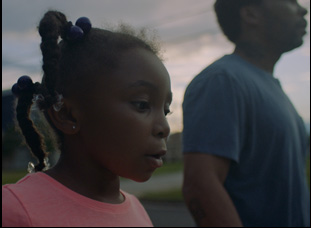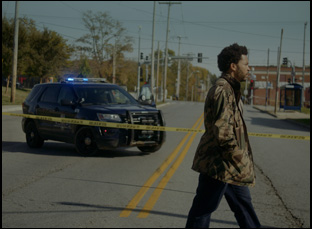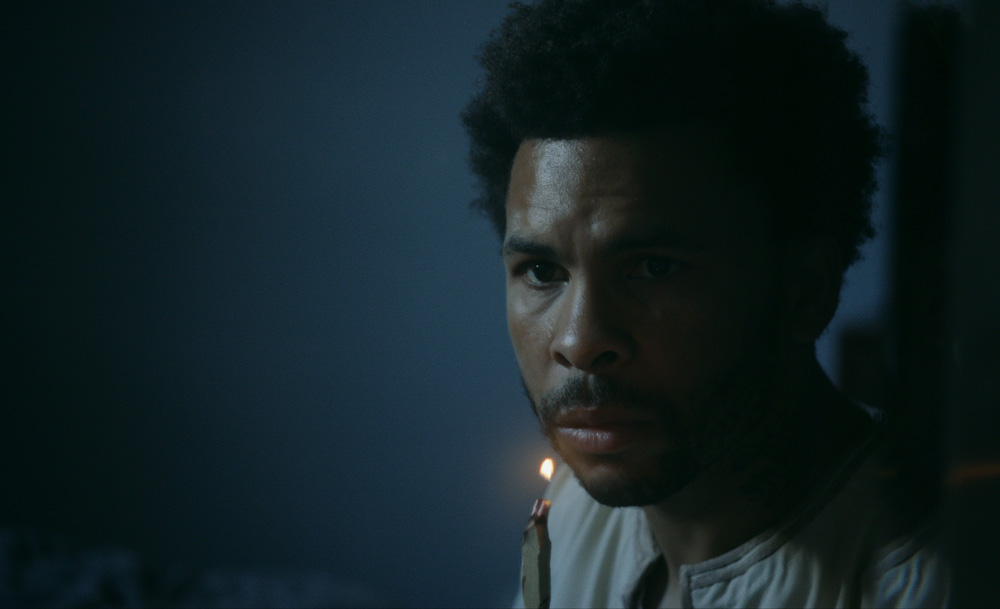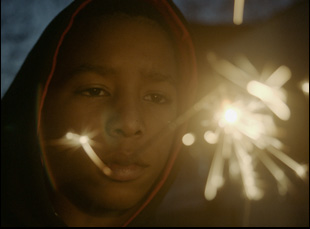As an Oscar-winning filmmaker and prolific producer, Roger Ross Williams receives a lot of project pitches, so it isn’t unusual for him to place a majority of them on the back burner. However, months after meeting Rosa Ruth Boesten through a mutual friend in Amsterdam, the “Life, Animated” director found himself unexpected moved to watch the teaser trailer she had sent him about the artist George Anthony Morton, who she had been filming since he had reemerged from prison after a years-long stretch where he used the time to mimic the brush strokes of Rembrandt in order to learn how to paint.
“I think George must have sent some spirit or something because I was sitting in my apartment and something just told me to watch the teaser at that moment,” recalled Williams. “I watched it and was like, ‘Oh my God, this is incredible. This art, his story, everything, Rosa’s beautiful work’ — I was just blown away. So I called my husband and I said, ‘You got to see this. I think I just discovered something.’”
It’s a feeling that anyone in the first audiences to see “Master of Light” this week at SXSW surely felt themselves after following Morton on his incredible journey back to Kansas City where the painter tries to reconcile the man he’s become with where he once was, still tied to a rough-and-tumble community through his mother, with whom he once shared a prison cell. While Morton appears to have pulled himself out of a vicious cycle of an area where drugs are rampant as a means of escaping the pain of living in poverty and the constant threat of violence, his 50-year-old mother doesn’t have another outlet to turn to as he did to channel her energy, making for a difficult relationship between the two when she continues to slip back into all kinds of disappointing old habits as he continues his ascension in the art world and starts a family of his own.
Chronicling how Morton shrewdly plotted a new life for himself one painting at a time, giving away his immaculately detailed and refined portraits at each place he stayed as a means of proving himself and potentially moving on to more hospitable location, Boesten honors his meticulous craftsmanship and artistry that so many have come to admire with an equally ravishing profile, often filming with the same evocative of light and shadow that’s to be found in his work and never incorporating flashbacks to the past as Morton firmly keeps his eyes fixed on what’s ahead, though there are hints all around of why he’s standing where he is now. “Master of Light” picked up the Grand Jury Prize for Best Documentary, the first of what are sure to be many accolades for the deeply moving documentary, and while in Austin, Boesten and Morton spoke about their collaboration on the film, their desire to speak to systemic issues in America that unfairly affect the Black community and how such an evocative shooting style came about.
Rosa Ruth Boesten: A friend of mine from the film academy [where I went to school] met George in New York where he was studying at the Florence Academy of Art. I had been making short films about artists in collaboration with [them] for some time, and she came back to Amsterdam, told me about his story, and I was just blown away by his artwork. She connected us and I met [George] briefly when he was doing a tour through Europe to visit all the major art museums. Four months later, I was in New York for another project and I started filming George for the first time for a couple of days, and with the first research material, I made a teaser and reached out to Roger. He saw the teaser and embraced the project. It seems as if this went super fast, but actually George and I had been working on getting this film off the ground for more than a year [at that point].
George, when you were approached with the idea of a film, was it something you were immediately open to?
George Anthony Morton: It felt fated. When I met Rosa, my life had already been on this trajectory that felt like it would be documented and [there was] this sense of us coming together feeling predestined in a way, so part of you expects it and then part of it just exceeds all expectations. When the news hit and Roger got involved, shit got real, and it was overwhelming. It was a blessing. I was just excited, and then it became about how to tell this story in the most honest and authentic way.
What was important for you to get across?
George Anthony Morton: Just the raw honesty of my story, but also some of the systemic issues that creates stories like this. I wanted some of those issues to be highlighted, not necessarily in a journalistic way, but being artistic myself and having an artistic director, it allowed us to find a poetic way to talk about these things.
Rosa Ruth Boesten: George and I talked about how to approach this many times — to really be on this immersive visceral journey, and for me, there is not really a distinction between fiction and nonfiction. You use so many different elements to create an emotion and to connect to the people in the film and to bring out the emotions that these really raw moments won’t, so it was really important to make a film that was rooted in reality, but at the same time had these more artistic interpretations. I get that question sometimes, “Did you stage a lot?” I think Jurgen Lisse, the cinematographer, and I both have a very cinematic eye, so we were always looking for ways to dignify these moments and to really create beauty in the same way George does with his paintings, within the scenes.
George Anthony Morton: That’s a huge point because she’s from Amsterdam and I’m studying Dutch art and the way light is designed and composed, and she’s immersed, absorbed within my own artistic aesthetic, so maybe in a way, the film is an extension of her artistic influences as a Dutch filmmaker where the king of painters is from, and all this amazing art, and a lot of the artistic influences of our favorite artists found its way into the way we composed the film.

Rosa Ruth Boesten: Yeah, that has been a huge journey while filming. There are so many layers and elements to George’s story, and George really showed me how his life’s experiences are tied to the racial injustice in this country and beyond. In the editing room, we had to find the story again because we had a vision, but we didn’t know what the exact story was going to be yet.
George Anthony Morton: That’s like a journey of discovery in a way, being open to what the story wanted to say. I can’t take any credit for that part because by the time they took the footage and went to the editing room, that’s where [Rosa’s] magic really shows and the magic of the whole team.
Rosa Ruth Boesten: Yeah, we had an amazing team — Ephraim Kirkwood is our editor, Enat Sidi, our supervising editor, and Francesca Sharper, our assistant editor, and the four of us actually edited in person, which was unique for this time [in the pandemic]. Everyone came to my apartment in the morning and we edited for months. There were so many elements that we wanted to speak to on a broader scale, like about how much potential is being discarded by society by the mass incarceration of Black people and we wanted to include these elements surrounding systemic racism, but in a very personal and subtle way by really experiencing how hard it is to get out of the system when so many odds are stacked up against you. What was new during the edit editing phase is that the focus really became on George’s relationship with his mother and how to heal that relationship.
George Anthony Morton: Yeah, they had to deal with a lot of my actual trauma around it, because the nature of the film really required for me to go into my healing journey in a real way. I didn’t even realize the difficulty of that, and I’m pretty sure they felt that. In one sense, it’s a good story, but it was a very real healing journey for me and having to relive that, I could have stayed as far away from that stuff as possible at this stage. I had escaped it by then, but not really. It was still dormant. It was still unhealed, parts of me, and the film became about that healing, so I had to go back into that world and, in a lot of ways, they had to go with me. That was challenging.

George Anthony Morton: One of the things that it puts into context is how incredibly talented my director and my team is. [laughs] I didn’t know they would do so well. But so much is in there, I could go on and on. It’s just hard to watch it because all of those moments are real and they weren’t staged, so having see it is very emotional.
What’s it like getting this out into the world now here at SXSW?
Rosa Ruth Boesten: It’s such an honor to be here and that this film has been selected. That we are having a world premiere at the first in-person film festival in two years, it’s amazing. Because of COVID we didn’t have [test] screenings with a lot of people, so to be in the audience and to feel the reactions to the film is truly humbling.
George Anthony Morton: Yeah, a milestone moment for sure and very much a sense of accomplishment in terms of having completed this really big project. In a lot of ways, it’s still very much the beginning and there’s more to come, but for me it just represented my reemergence and now I have my own practice through which a lot of the outreach towards the issues coming up in the film will be addressed in the community as well.
“Master of Light” will screen at SXSW on March 19th at 5:45 pm at the Alamo Lamar A.





